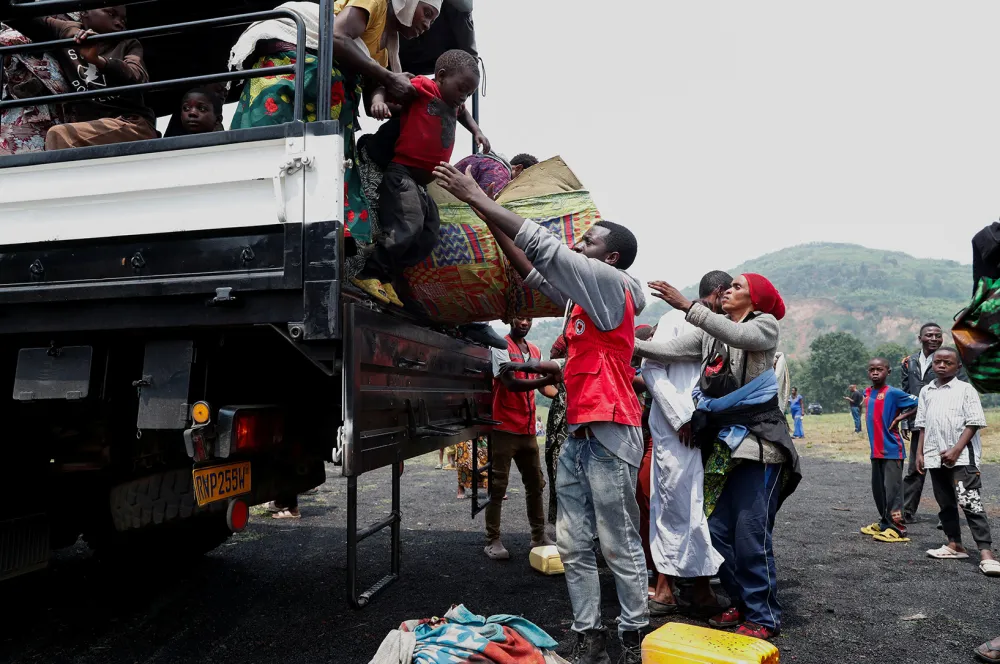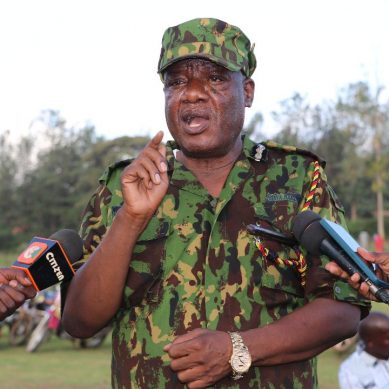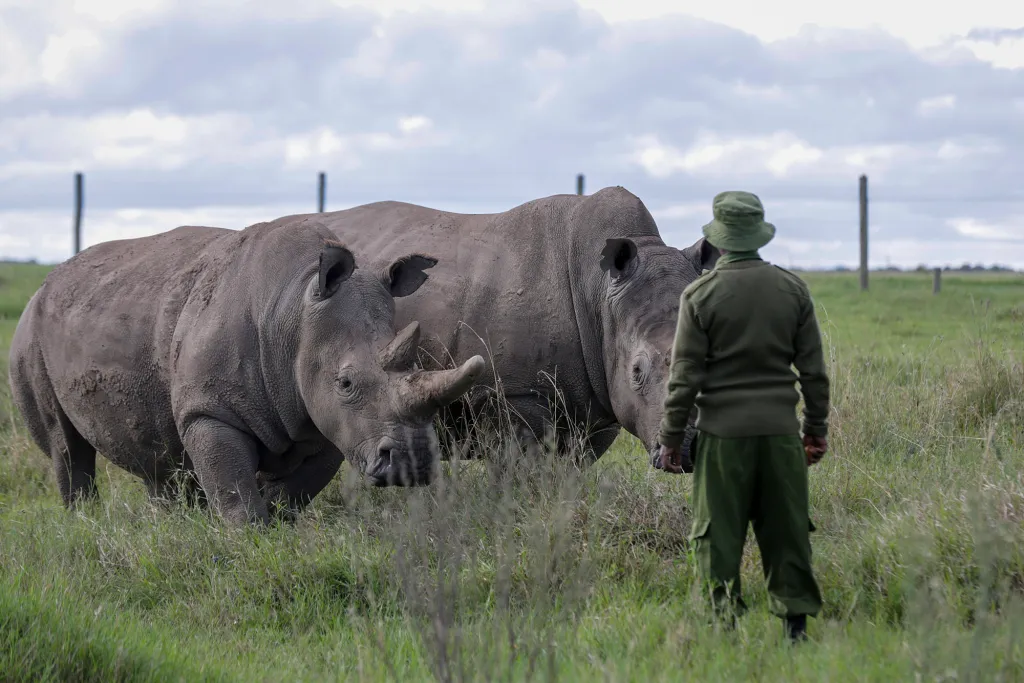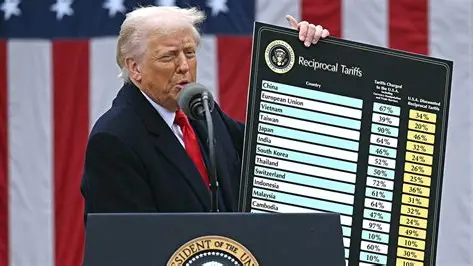
Transfers of refugees and other individuals from areas controlled by the M23 rebel group in eastern Democratic Republic of the Congo to neighbouring Rwanda have raised concerns over potential war crimes and the role of the UN refugee agency, UNHCR.
Thousands of people have been moved to Rwanda in recent months, with some transfers carried out directly by M23 and others approved by the Congolese government but involving individuals who lived in areas that are under M23 control.
The M23 is backed extensively by Rwanda, which has long sought the return of refugees from DRC, including those it regards as linked to Hutu armed groups such as the Democratic Forces for the Liberation of Rwanda or FDLR.
The FDLR was founded after the 1994 genocide against the Tutsi in Rwanda, when genocidaires fled across the border into eastern DRC, along with nearly two million Hutu civilians.
People affected by the transfers described those organised by the M23 as deportations – involving Rwandan refugees seen as aligned with the FDLR but also Congolese citizens – while aid workers questioned UNHCR’s role in facilitating them.
“It was brutal like you wouldn’t believe,” said Franck (not his real name) who managed to escape a deportation in May. He said he was rounded up by the M23 alongside dozens of other men who were originally from Hutu villages reputed to be FDLR strongholds.
Other transfers rubber-stamped by the Congolese government were described by UNHCR as voluntary. But these movements have also raised concern given that the people who left DRC all came from areas where the M23 is active.
In recent months, the M23 has cleared villages and massacred hundreds of mostly Rwandaphone Hutu civilians in North Kivu (the rebel’s main area of operations), atrocities that Human Rights Watch have said may amount to ethnic cleansing.
Clémentine de Montjoye, a researcher at Human Rights Watch said international organisations such as UNHCR should consider whether people signing up for transfer to Rwanda are doing so “out of fear of facing abuse if they remain”.
The M23 is commanded by Congolese Tutsis and is the latest in a long line of armed groups in the country that have been backed by Rwanda. Earlier this year, the group conquered eastern DRC’s two largest cities – Goma and Bukavu.
After decades of conflict in the east, the group has presented its advance as a “liberation” and established a parallel administration. But human rights groups accuse it of widespread abuses across the areas it now controls.
The population transfers have gone largely unnoticed internationally, although they have affected significant numbers of people and have raised questions about how humanitarian organisations should operate in M23-controlled areas.
One of the most concerning incidents happened in mid-May when the M23 rounded up nearly 2,000 people in North Kivu and forcibly deported the vast majority of them, according to five affected people and several UN officials aware of what happened.
Franck, who was one of those affected, said that on May 15, in the dead of night, M23 rebels burst into the displacement centre where he was sleeping and arrested him alongside dozens of other men. He had been forced to leave Goma three months earlier, after the M23 captured the city. But the rebels prevented him, and thousands of others, from returning to their mostly Hutu village because they believed the FDLR was present there.
Franck said he and others camped in a school in the town of Sake, which is close to Goma, waiting for permission to go home. That was until the night they were rounded up and forced onto buses.
Franck said the rebels first took them to a stadium in Goma, where they burned their identity documents. He said he was then moved to a transit centre run by UNHCR, which eventually identified him as Congolese, meaning he was allowed to leave.
“[The M23] said we were working with the FDLR,” Franck said, making clear that he is a civilian. He added that the rebels struck and whipped some of the people who were with him.
Two other affected people said they were also identified as Congolese and allowed to leave but the remaining two said they were deported and had to sneak back into North Kivu after finding life in Rwanda too difficult.
A women who was deported said she was born in DRC and had no friends or family in Rwanda. She said she was separated from her husband during the deportation, and that he, a Hutu born in North Kivu, remains in Rwanda.
Rwanda has operational command over the M23, according to UN experts. Human Rights Watch argues that Rwanda is therefore the occupying power in the areas of DRC that are controlled by the rebels.
The Geneva Conventions prohibit the forced displacement of populations under military occupation, and the rights group has therefore described the deportations as constituting war crimes.
Rwanda’s foreign ministry said that all Rwandans who had returned had signed voluntary repatriation forms. The M23 did not respond to requests for comment.
UNHCR’s role in the deportations has raised major concerns, as the agency’s mandate allows it to repatriate refugees only when they fully consent to return to their countries of origin. At the transit centre in Goma, UNHCR staff sought to determine nationalities, but people were not informed that they had a choice about leaving, according to the five affected people.
The individuals said they had very limited discussions with UNHCR staff members and were simply told by the M23 that if they were Rwandan then they would have to leave DRC.
Among humanitarian workers, the deportations caused disquiet, with one senior UN official calling the affair a scandal and saying those responsible should face severe disciplinary action or lose their jobs.
Many felt that the agency’s presence and assistance gave cover to the M23 and Rwanda, helping to legitimise the process.
On May 17, Rwanda’s foreign minister, Olivier Nduhungirehe, said on social media that the refugees were returning willingly. “The repatriation was organised by the UNHCR, a UN agency that never repatriates refugees against their will,” he said.
Still, one UN official, requesting anonymity, explained that M23 officers had informed them that the villagers they had arrested would be deported with or without UNHCR involvement.
“We didn’t really have a choice,” the official said, adding that the agency chose to get involved to offer a modicum of protection by registering those being transferred and accompanying them across the border, rather than letting them simply disappear.
In response to questions, a UNHCR spokesperson said the agency had followed its “operational guidelines for such situations”.
“We continue to strongly advocate that all returns should be fully voluntary and conducted in safety and dignity, while making sure that those whose return takes place under adverse circumstances are not left on their own and have access to critical support,” the spokesperson said.
During screening and interviews, the spokesperson said 72 individuals declared themselves as Congolese and were sent back to their place of origin, which in this case was Sake.
The spokesperson said there were survivors of gender-based violence, medical needs cases, and separated children among the group of deportees, and that they were provided with support upon arrival at transit centres in Rwanda.
Jeff Crisp, a visiting research fellow at the University of Oxford’s Refugee Studies Centre, and a former senior UNHCR official, said the agency has “on many occasions become involved in forced or induced returns”.
Crisp shared an example from 1996, in which UNHCR assisted the Tanzanian government as it forcibly repatriated hundreds of thousands of Rwandan refugees. The rationale was to help the people being expelled, international law notwithstanding.
While the Goma deportation fits within this history, the situation on the ground has, if anything, grown more complex. The parallel M23 administration is at odds with the central government, leaving international organisations to walk a tightrope between the two.
One UN official said the risk of angering the M23, in particular, is that the rebels could block humanitarian access. “It’s a very complicated and sensitive situation,” the official said.
Since the May deportations, there have been no further violent round-ups by the M23, but there have been several repatriation convoys organised for people who were living in M23-held parts of North Kivu.
These returns were approved by DRC’s national refugee agency, known as CNR, whose North Kivu headquarters are now in Beni, a city on the edge of M23-controlled territory but under Kinshasa’s authority.
The UNHCR spokesperson said these returns have been voluntary and that its staff members have also screened the individuals who were repatriated. Such returns are far from unusual with thousands of Rwandan refugees having gone back home voluntarily over the years for a range of personal, social, and economic reasons.
But some question whether any transfers from M23-occupied territory can be truly voluntary given the repatriations serve the political interests of Rwanda, and given rebel abuses against Hutu communities.
One convoy in August transferred more than 500 people from North Kivu to Rwanda, with Rwandan state media present at the border to cover the return – underscoring the political significance attached to the process.
Others noted that the rebels have appointed one of their own officials to lead the local branch of the CNR in Goma, raising questions about the extent of the group’s involvement in the transfers.
Refugee returns are set to be an even bigger issue in the months to come, since it is part of a controversial agreement that the Congolese and Rwandan governments signed on 27 June to end the conflict.
Known as the Washington Accord, the deal requires the DRC to dismantle the FDLR and Rwanda to pull back its troops from eastern areas. It also identifies the repatriation of all Congolese and Rwandan refugees as a “desired final end state”.
According to official figures, around 200,000 Rwandan refugees currently live in DRC, mostly in North Kivu. Conversely, some 83,000 Congolese refugees live in Rwanda.
Franck, the man caught in the May round-up, said he is now living around Goma, trying to scratch out a living. He said the M23 still won’t let him return to his village. “We’re obliged to stay quiet and submit to their decisions,” he said. “There’s no justice.”
- A Tell Media report







